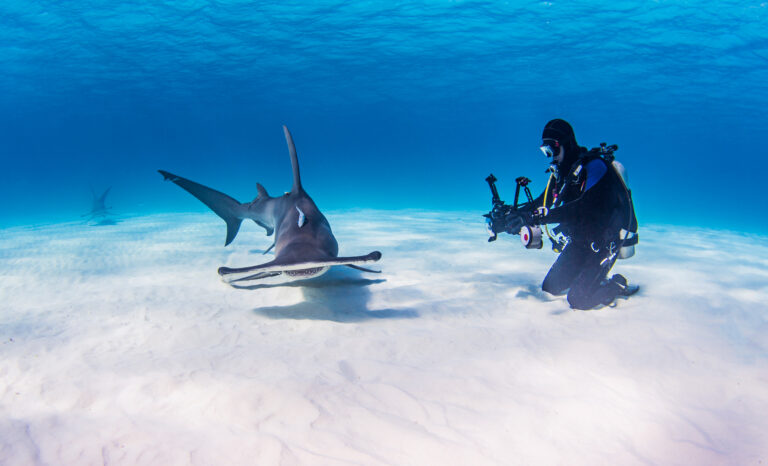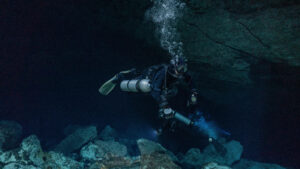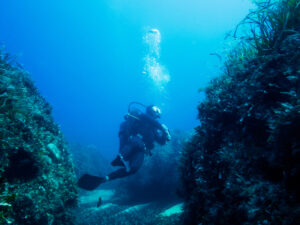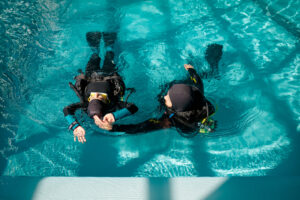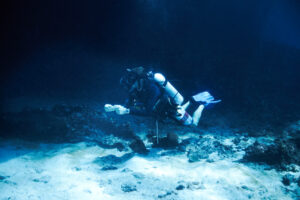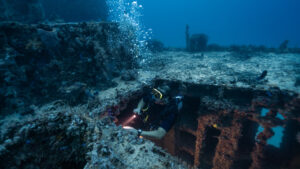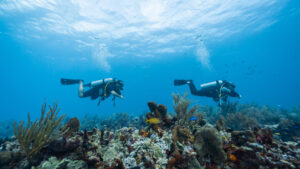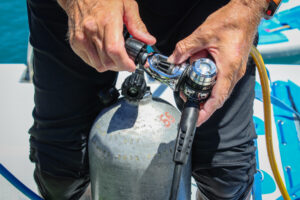What is the Global Positioning System (GPS) for Divers?
The Global Positioning System (GPS) has changed the way we navigate, whether on land, at sea, or in the air. Originally developed for military use, GPS technology has since become a staple in various outdoor activities, including scuba diving. Divers now rely on GPS for accurate navigation, safety, and data recording during dives. This system allows them to navigate underwater environments with more confidence and efficiency. As GPS technology evolves, its application in scuba diving becomes more specialized, offering tailored solutions to the challenges divers face in the underwater world.
GPS Fundamentals
The Global Positioning System (GPS) is a satellite-based navigation network maintained by the United States Department of Defense. The system is composed of 24 satellites orbiting Earth at an altitude of approximately 20,200 kilometers (12,550 miles). These satellites emit signals that transmit time and location data. GPS receivers on Earth use these signals to calculate their precise position. This is done through a process known as trilateration, which involves measuring the time it takes for signals to travel from the satellites to the receiver. By calculating the time difference, the receiver can determine its location in terms of latitude, longitude, and altitude.
Trilateration requires at least four satellites to accurately pinpoint a location. The receiver compares the signals from these satellites and uses this information to triangulate its exact position. Although GPS systems are highly accurate, several factors, such as atmospheric conditions, satellite geometry, and signal obstruction, can affect precision. Despite these challenges, GPS remains the most reliable system for global navigation, including in diving applications.
The introduction of GPS to the diving community revolutionized underwater navigation. Divers can now log precise coordinates for dive sites, reducing the risk of becoming disoriented. As a result, they can explore remote or challenging dive sites with more assurance. The ability to record and retrieve specific locations has also enhanced the recreational and scientific aspects of diving, making GPS a critical tool for both casual and professional divers alike.
Devices and Features
Conventional GPS devices are not suitable for underwater use due to their susceptibility to water damage and signal loss. However, recent technological advancements have led to the development of specialized GPS devices for divers. These devices are designed to be waterproof, pressure-resistant, and durable enough to withstand the harsh underwater environment.
One of the most popular GPS options for divers is the dive computer with integrated GPS functionality. These devices do more than just track location; they also provide essential dive information, such as depth, dive time, and decompression data. Dive computers with GPS are typically wrist-mounted or attached to the diver’s Buoyancy Control Device (BCD), making them convenient to use during a dive. Their user-friendly interfaces allow divers to access information quickly and easily, which is crucial in high-pressure underwater situations.
Stand-alone GPS devices specifically designed for divers are another option. These devices are usually compact and lightweight, ensuring they do not interfere with the diver’s mobility. Many models include a lanyard or clip, making them easy to attach to the diver’s gear. These devices offer various features that cater to the unique needs of divers, such as:
- High-resolution color displays that show maps, navigation data, and dive site information.
- Preloaded maps and databases of popular dive sites that can be updated or expanded with new locations added by users.
- The ability to mark and store waypoints, enabling divers to save the exact coordinates of dive sites for future exploration.
- Track logging, which records the diver’s path underwater, allowing for post-dive analysis or sharing with other divers.
- Integration with dive planning software, helping divers to better prepare for their dives and ensuring safer dive practices.
- Wireless data transfer, which allows divers to upload dive data to online platforms or share it with other divers for collaborative planning or review.
As these devices evolve, they continue to incorporate more advanced features that make diving safer and more enjoyable. The waterproof construction and pressure resistance of dive-specific GPS devices ensure that they remain functional even in challenging underwater conditions, where other electronics would fail.
Benefits of GPS for Divers
The use of GPS technology in scuba diving offers several substantial advantages, making it an essential tool for both recreational and technical divers. One of the most notable benefits is enhanced navigation. GPS-equipped dive computers allow divers to navigate complex underwater environments, such as wrecks or coral reefs, with greater ease. This can be especially important when diving in unfamiliar or difficult-to-navigate locations where disorientation can pose significant risks.
GPS devices also assist divers in locating dive sites with precision. Previously, divers relied on manual charts and general coordinates, which often led to time-consuming searches. With GPS, divers can input exact coordinates and navigate directly to the site. This accuracy not only saves time but also minimizes the risk of missing a dive site or accidentally entering hazardous areas.
Another major benefit is the safety factor. In emergencies, GPS devices provide an additional layer of security by helping divers find their way back to the surface or return to a designated exit point. For example, in strong currents or low-visibility conditions, having a reliable GPS system can prevent divers from becoming disoriented or separated from their dive group. Furthermore, some GPS-enabled devices are equipped with distress signals or tracking features that allow surface support teams to monitor divers in real time, improving overall safety.
GPS devices also serve as tools for documenting and analyzing dives. Divers can log their routes, noting specific points of interest or environmental conditions, such as coral formations or marine life sightings. This information can be invaluable for research, conservation efforts, or even just personal record-keeping. Many GPS-enabled dive computers allow users to upload their dive logs to online platforms, where they can share their experiences with other divers or compare dive sites. This creates a rich resource for divers who are planning future trips.
In terms of community engagement, GPS technology fosters a sense of collaboration among divers. By sharing dive data, such as the exact locations of interesting underwater features, divers contribute to a broader pool of knowledge. This exchange of information not only enhances individual diving experiences but also promotes a more connected global diving community.
Finally, GPS technology can also aid in environmental monitoring. By providing accurate location data, divers can document changes in marine ecosystems over time, contributing to conservation efforts. For example, divers can monitor coral bleaching events or shifts in fish populations, using GPS data to track these changes at specific dive sites. This information is valuable for researchers and conservationists who rely on precise data to develop strategies for protecting marine environments.
Limitations and Considerations
While the benefits of GPS for divers are numerous, it is important to recognize the limitations and considerations that come with using this technology underwater. One of the primary challenges is signal loss. GPS signals, which are transmitted by satellites orbiting Earth, can weaken or disappear entirely when underwater. This is particularly true at greater depths, where water density and other factors block or distort the signals. As a result, divers often cannot rely solely on GPS for navigation while submerged. To mitigate this, divers use surface markers or rely on surface support vessels equipped with GPS to provide location data.
Battery life is another consideration. Many GPS devices, especially those with high-resolution displays and multiple features, consume a significant amount of power. Divers need to ensure that their devices are fully charged before a dive, and in some cases, carrying spare batteries or portable chargers may be necessary for extended dive trips. Running out of battery power mid-dive could leave a diver without access to critical information, so monitoring power levels is essential.
The accuracy of GPS devices can also be affected by environmental factors. For example, atmospheric conditions, the geometry of the satellite constellation, and signal reflections off surfaces like water or rocks can introduce errors into the location data. These inaccuracies may be minor, but in situations where precise navigation is critical, divers should use GPS in conjunction with other tools, such as compasses or natural landmarks, to verify their position.
Cost is another factor to consider. High-quality GPS devices designed specifically for diving can be expensive. Divers should carefully assess their needs before investing in a GPS device, taking into account the type of diving they do and how frequently they will use the device. For some divers, a basic dive computer with GPS may be sufficient, while others may require more advanced features, such as track logging or integration with dive planning software.
Training is also essential for the effective use of GPS devices. Divers must understand how to operate the device, interpret the data it provides, and troubleshoot any issues that arise. This may require additional education or hands-on practice, especially for divers who are new to using GPS technology. Proper training can maximize the benefits of GPS devices and ensure that they are used safely and effectively.
Key Takeaways
GPS technology has significantly improved the scuba diving experience by providing divers with accurate navigation and valuable data collection tools. Specialized GPS devices designed for underwater use offer a range of features that enhance safety, convenience, and environmental awareness. Understanding the principles, benefits, and limitations of GPS devices allows divers to make informed decisions about incorporating this technology into their dives.

